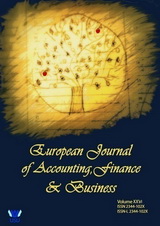|

ISSN: 2344 - 102X
ISSN-L: 2344 - 102X
Our journal is currently indexed in the following databases:
|
| |
Article from Volume 10, Number 2, Year 2022| APPROACHES TO EU ANTI-FRAUD INSTRUMENTS | 
Download | | Author(s): Irina - Stefana Cibotariu | | DOI: 10.4316/EJAFB.2022.10217 | | Abstract: The objective of this paper is to attempt to reconstruct the patterns of general fraud schemes and, in parallel, to analyze and argue which are the main tools that have emerged and are constantly evolving to counter the spread of fraud in different sectors and channels of the modern landscape. Thus, the main purpose is not to present an all-encompassing analysis of the entire scope of the fraud literature, but to provide a description of the different forms of fraudulent behavior in the context of a company's activities, the prevalence and consequences of such behavior. It is therefore essential to ensure the existence and effective tools in order to prevent, measure and assess the risks that may arise from fraudulent operations, with the ultimate aim of nipping in the bud the sequence of illicit maneuvers between the ranks of corporate life. In this paper, we start by defining the key elements that revolve around the concept of fraud, while considering the exogenous and endogenous variables that influence it. | | Keywords: Anti-fraud Policy; Anti-fraud Strategies; Audit Authority; European Commission; Tax Fraud. | References:
1. Bakhtigozina, E. I., Ustinova, N. D., & Stulov, G. A. (2017). Assessment Of Fraud Risks In Financial Accounting. Economics And Enterprise, 5-2.
2. Dyck, A., Morse, A., & Zingales, L. (2010). Who Blows The Whistle On Corporate Fraud? The Journal Of Finance, 65(6), 2213-2253.
3. European Commision (2021). Budget Expenses. Retrieved 14 May, 2022 From Http://ec.europa.eu/budget/edes/index_en.cfm
4. European Commission, EU Funds Anti-Fraud Knowledge & Resource Centre. Retrieved 17 May, 2022 From Https://antifraud-knowledge-centre.ec.europa.eu/index_en
5. Lederman, L. (2019, January). The Fraud Triangle And Tax Evasion. In Proceedings. Annual Conference On Taxation And Minutes Of The Annual Meeting Of The National Tax Association (Vol. 112, Pp. 1-54). National Tax Association.
6. Masli, A., Peters, G. F., Richardson, V. J., & Sanchez, J. M. (2010). Examining The Potential Benefits Of Internal Control Monitoring Technology. The Accounting Review, 85(3), 1001-1034.
7. OLAF Report (2022). Twenty-first Report Of The European Anti-Fraud Office. Retrieved May 15, 2022 From Https://anti-fraud.ec.europa.eu/about-us/reports/annual-olaf-reports_en
8. Reffett, A. B. (2010). Can Identifying And Investigating Fraud Risks Increase Auditorsí Liability? The Accounting Review, 85(6), 2145-2167.
9. Sandgren, C. (2005). Combating Corruption: The Misunderstood Role Of Law. Int'l Law., 39, 717.
10. Stanojevic, J., Dimovski, D., & Milic, I. (2018). The Impact Of Corruption On National Competitiveness. Collection Papers Fac. L. Nis, 79, 297.
|
| | Back to journal ... |
|
|
| |
|
|
|

